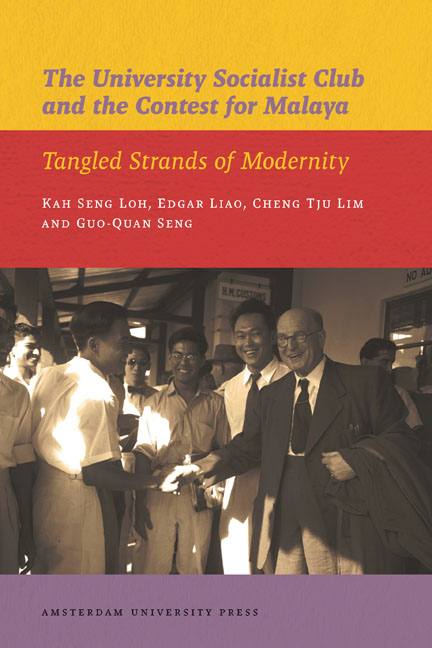Book contents
- Frontmatter
- Dedication
- Contents
- Acknowledgments
- List of Photographs
- Abbreviations
- 1 The Socialist Club and the Modernity Project
- 2 Awake in the Bowl of Night
- 3 The Fajar Trial
- 4 Visionary of the Nation, Voice of Stifled Malayans
- 5 A Beacon of Light on the Campus and Beyond
- 6 Frankly Partisan in the Struggle for Student Leadership
- 7 The Shadow over the Club
- 8 Resisting Malaysia, Swansong for Malaya
- 9 Long Night after Coldstore
- 10 In Defence of University Autonomy and Student Rights
- 11 Entwined Memories and Myths
- Conclusion: Modernity in Singapore and Malaya Reconsidered
- The University Socialists: Biographical Sketches
- Timeline of Events
- Notes
- Bibliography
- Index
- Publications Series
Conclusion: Modernity in Singapore and Malaya Reconsidered
Published online by Cambridge University Press: 21 January 2021
- Frontmatter
- Dedication
- Contents
- Acknowledgments
- List of Photographs
- Abbreviations
- 1 The Socialist Club and the Modernity Project
- 2 Awake in the Bowl of Night
- 3 The Fajar Trial
- 4 Visionary of the Nation, Voice of Stifled Malayans
- 5 A Beacon of Light on the Campus and Beyond
- 6 Frankly Partisan in the Struggle for Student Leadership
- 7 The Shadow over the Club
- 8 Resisting Malaysia, Swansong for Malaya
- 9 Long Night after Coldstore
- 10 In Defence of University Autonomy and Student Rights
- 11 Entwined Memories and Myths
- Conclusion: Modernity in Singapore and Malaya Reconsidered
- The University Socialists: Biographical Sketches
- Timeline of Events
- Notes
- Bibliography
- Index
- Publications Series
Summary
By charting the history of the University Socialist Club, this book has offered a new approach to understanding the making of post-colonial Singapore and Malaya. The period has typically been viewed as one of ideological conflict, between the British and nationalists, between the nationalists and communists, between Singapore and Malaysia. It is also one where the necessity of social, economic and political change which the contending parties advocated has been accepted without question, where the “old order” and the “culture” of the masses were held to be not only obsolete but injurious to the making of new states and societies.
What this study has done, rather, is to locate the forces of conflict and change within an ambitious modernist project undertaken after World War II. Using Partha Chatterjee's idea of nationalism as a derivative discourse originating from the post-Enlightenment rationalism, this book frames the various parties involved in the remaking of post-war Singapore and Malaya as tangled strands of modernity – differing in their approaches and methods but agreeing on the basic need to reorder the countries along rationalist-scientific lines into new nation-states. Rather than construct a narrative of contestation between the PAP and its left-wing opponents, this book underlines their shared optimism in the future and their common pursuit of a nationalist modernity. The struggle to establish a new nation-state was largely defined, as T.N. Harper notes, by the Second Malayan Spring experiment from roughly 1953 to 1959. As suggested by the decolonisation thesis advanced by Roger Louis and Ronald Robinson, the experiment involved a return to informal empire, commercial priorities and Britain's search for new collaborators who could better serve its interests in the postcolonial era. The Socialist Club, and the left generally, helped facilitate this mission, which was eventually accomplished with the rise and dominance of the PAP.
The Second Malayan Spring permitted the emergence of different groups of politicians and activists with different ideas of modernity and development: liberal-democrats, communalists, Fabian socialists and Marxist socialists. These various groups constituted what some scholars have called “multiple modernities”, a term usually ascribed to non-Western forms of modernity which departed significantly from the Western liberal-democratic type, but which remained distinctively modernist in their optimism towards a better future.
- Type
- Chapter
- Information
- The University Socialist Club and the Contest for MalayaTangled Strands of Modernity, pp. 255 - 264Publisher: Amsterdam University PressPrint publication year: 2012



